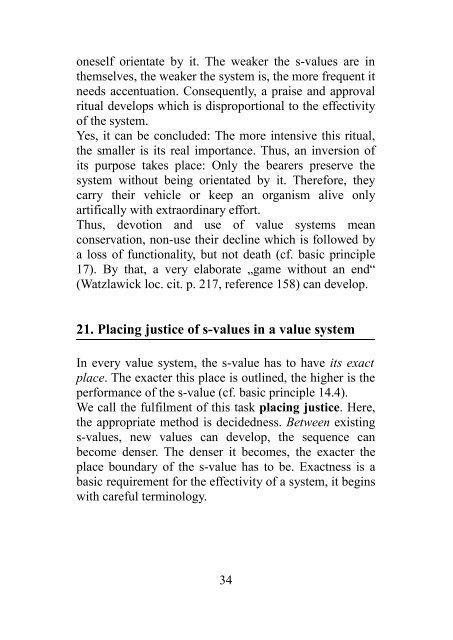Part I - David Greve
Part I - David Greve
Part I - David Greve
You also want an ePaper? Increase the reach of your titles
YUMPU automatically turns print PDFs into web optimized ePapers that Google loves.
oneself orientate by it. The weaker the s-values are in<br />
themselves, the weaker the system is, the more frequent it<br />
needs accentuation. Consequently, a praise and approval<br />
ritual develops which is disproportional to the effectivity<br />
of the system.<br />
Yes, it can be concluded: The more intensive this ritual,<br />
the smaller is its real importance. Thus, an inversion of<br />
its purpose takes place: Only the bearers preserve the<br />
system without being orientated by it. Therefore, they<br />
carry their vehicle or keep an organism alive only<br />
artifically with extraordinary effort.<br />
Thus, devotion and use of value systems mean<br />
conservation, non-use their decline which is followed by<br />
a loss of functionality, but not death (cf. basic principle<br />
17). By that, a very elaborate „game without an end“<br />
(Watzlawick loc. cit. p. 217, reference 158) can develop.<br />
21. Placing justice of s-values in a value system<br />
In every value system, the s-value has to have its exact<br />
place. The exacter this place is outlined, the higher is the<br />
performance of the s-value (cf. basic principle 14.4).<br />
We call the fulfilment of this task placing justice. Here,<br />
the appropriate method is decidedness. Between existing<br />
s-values, new values can develop, the sequence can<br />
become denser. The denser it becomes, the exacter the<br />
place boundary of the s-value has to be. Exactness is a<br />
basic requirement for the effectivity of a system, it begins<br />
with careful terminology.<br />
34


